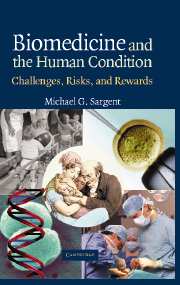Book contents
- Frontmatter
- Contents
- Preface
- 1 Challenges, Risks, and Rewards: Learning to Control Our Biological Fate
- 2 Learning to Breed Successfully
- 3 How Life is Handed On
- 4 Cells in Sickness and Health
- 5 Experiences in Utero Affect Later Life
- 6 Infection, Nutrition, and Poisons: Avoiding an Unhealthy Life
- 7 Signs of Ageing: When Renovation Slows
- 8 Cancer and the Body Plan: A Darwinian Struggle
- 9 Fighting Infection
- 10 Are Devastating Epidemics Still Possible?
- 11 Discovering Medicines: Infinite Variety through Chemistry
- 12 Protein Medicines from Gene Technology
- 13 Refurbishing the Body
- 14 Living with the Genetic Legacy
- 15 Epilogue: Signposts to “Wonderland”
- References
- Index
8 - Cancer and the Body Plan: A Darwinian Struggle
Published online by Cambridge University Press: 06 August 2009
- Frontmatter
- Contents
- Preface
- 1 Challenges, Risks, and Rewards: Learning to Control Our Biological Fate
- 2 Learning to Breed Successfully
- 3 How Life is Handed On
- 4 Cells in Sickness and Health
- 5 Experiences in Utero Affect Later Life
- 6 Infection, Nutrition, and Poisons: Avoiding an Unhealthy Life
- 7 Signs of Ageing: When Renovation Slows
- 8 Cancer and the Body Plan: A Darwinian Struggle
- 9 Fighting Infection
- 10 Are Devastating Epidemics Still Possible?
- 11 Discovering Medicines: Infinite Variety through Chemistry
- 12 Protein Medicines from Gene Technology
- 13 Refurbishing the Body
- 14 Living with the Genetic Legacy
- 15 Epilogue: Signposts to “Wonderland”
- References
- Index
Summary
Cancer, one of the defining personal anxieties of the twentieth century, is also one of the greatest biological puzzles that confront humanity. Perhaps a single cell, out of the trillions of cells in the body, starts a kind of rebellion against the great plan that gives each cell its identity. More genetic changes follow in the same cell or its descendants, to establish a dangerous malignancy. Biologists see the disease as a Darwinian struggle between the anarchic and outrageous stratagems of malignant cells and the organisational forces of the body. Probably only 20 percent of the risk of cancer is inherited; the remainder originates in life experiences that cause the genetic changes that start these insidious chain reactions. Like the ageing process considered in the last chapter, cancer originates in the absence of maintenance that is totally effective. Cancer is the most complicated and scientifically difficult disease we face, but our understanding is advancing sufficiently to allow hope for really effective control of ongoing cancers and the identification of environmental cues that initiate the disease.
Twentieth-Century Nightmare
In the generation that reached middle age in the early twentieth century, the family was frequently faced with cancer for the first time in its collective memory. No remedies or palliative care could ease a terrible illness that often struck when its victims were still in their prime.
- Type
- Chapter
- Information
- Biomedicine and the Human ConditionChallenges, Risks, and Rewards, pp. 153 - 173Publisher: Cambridge University PressPrint publication year: 2005



